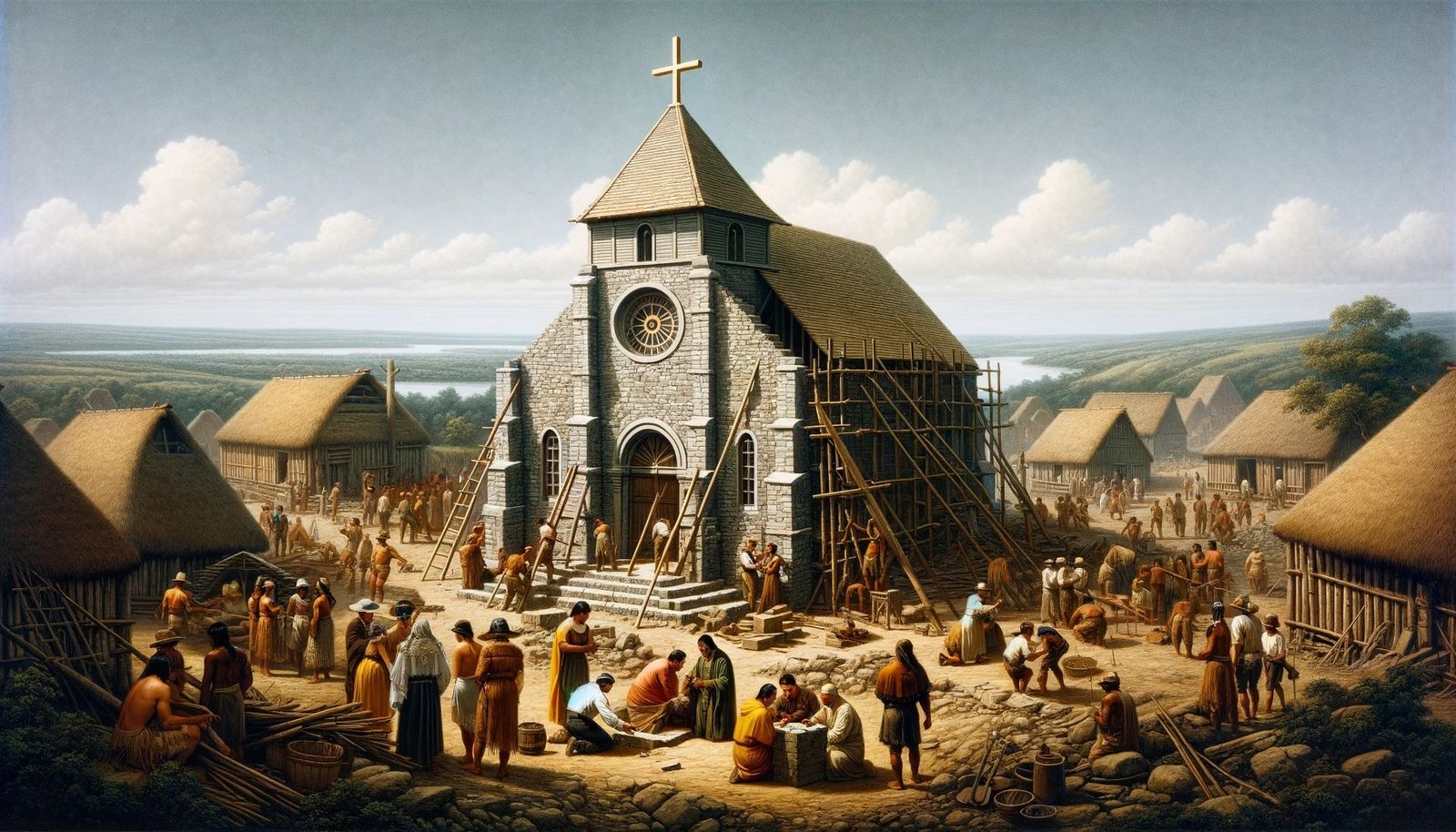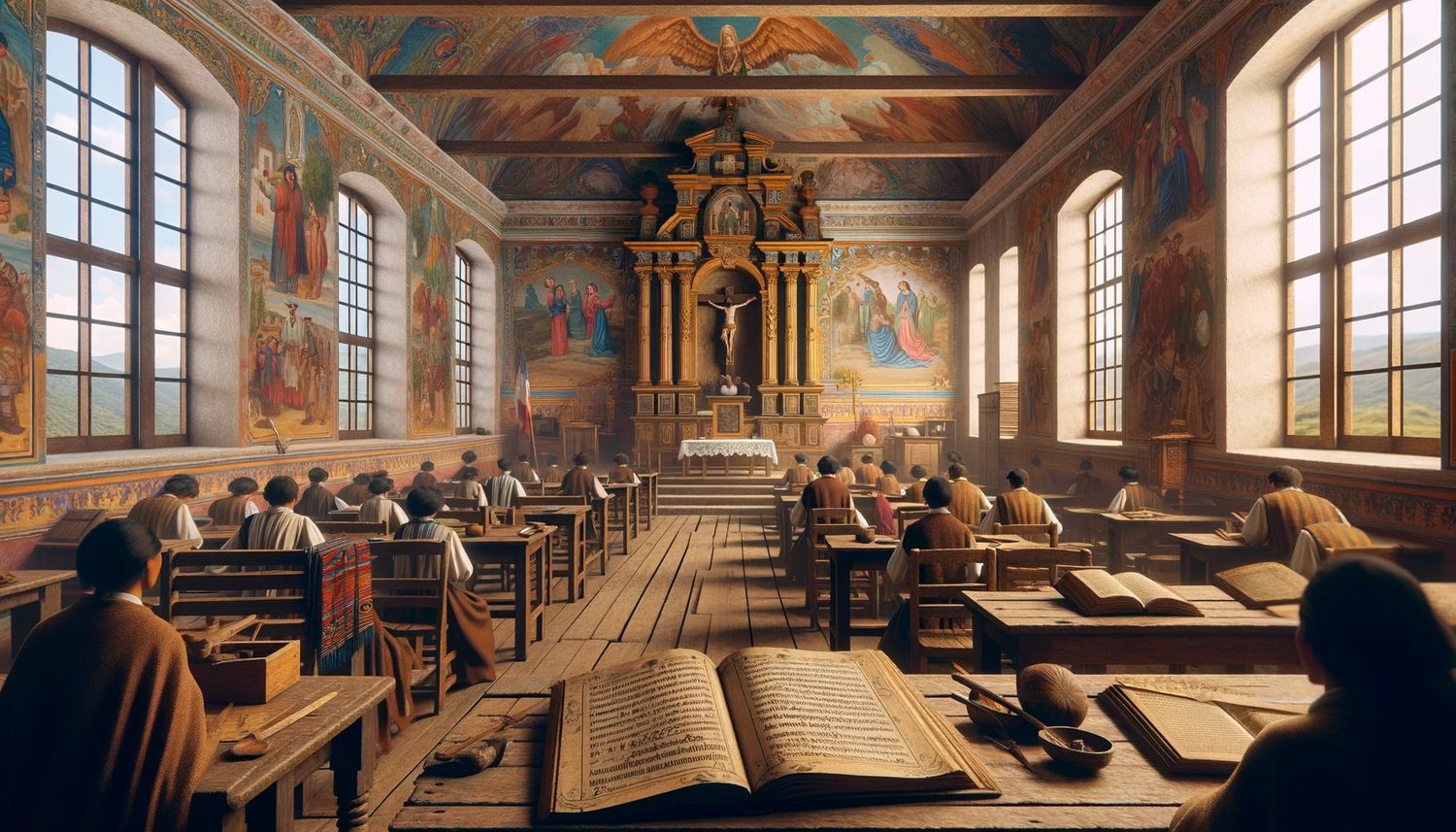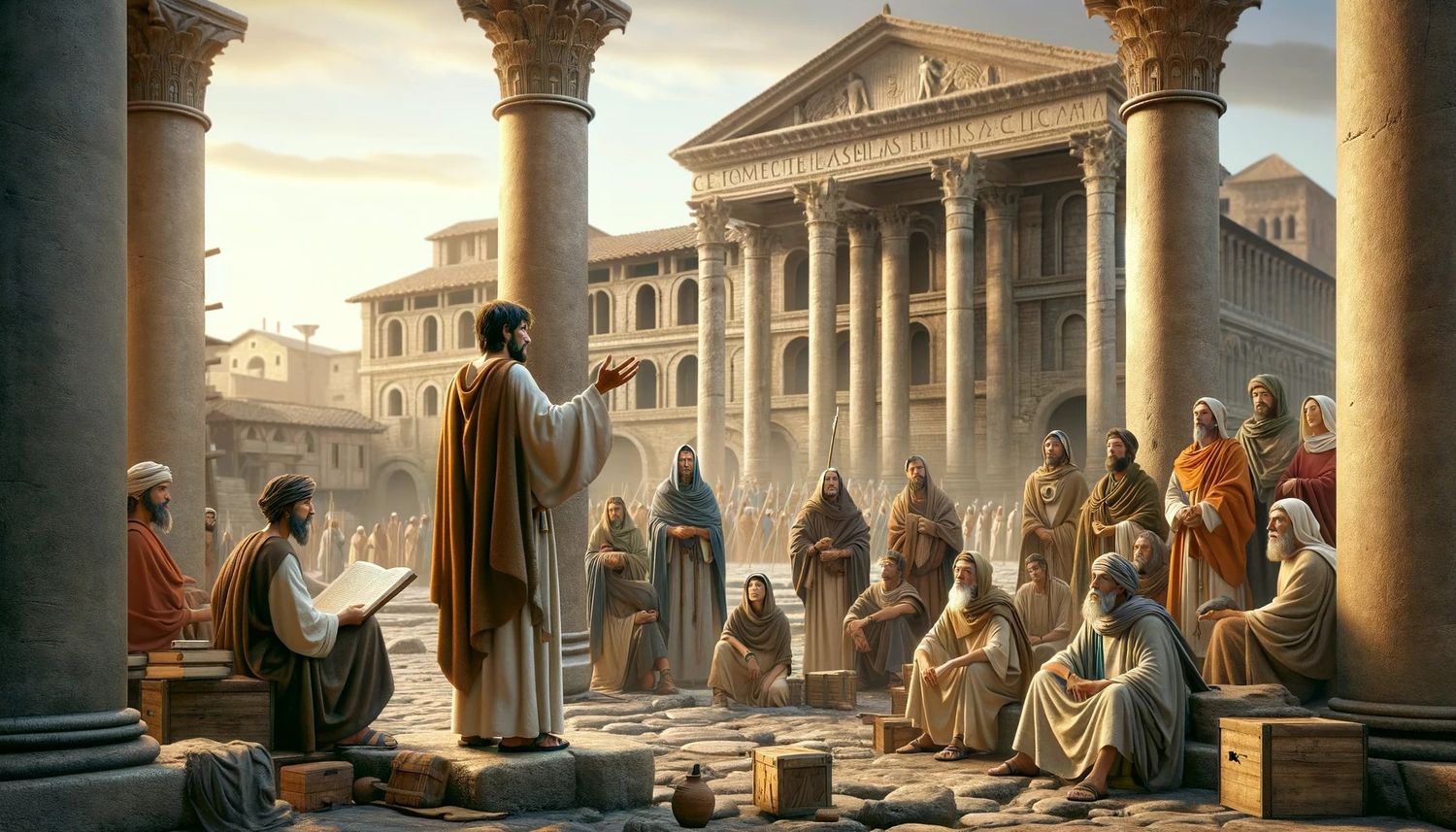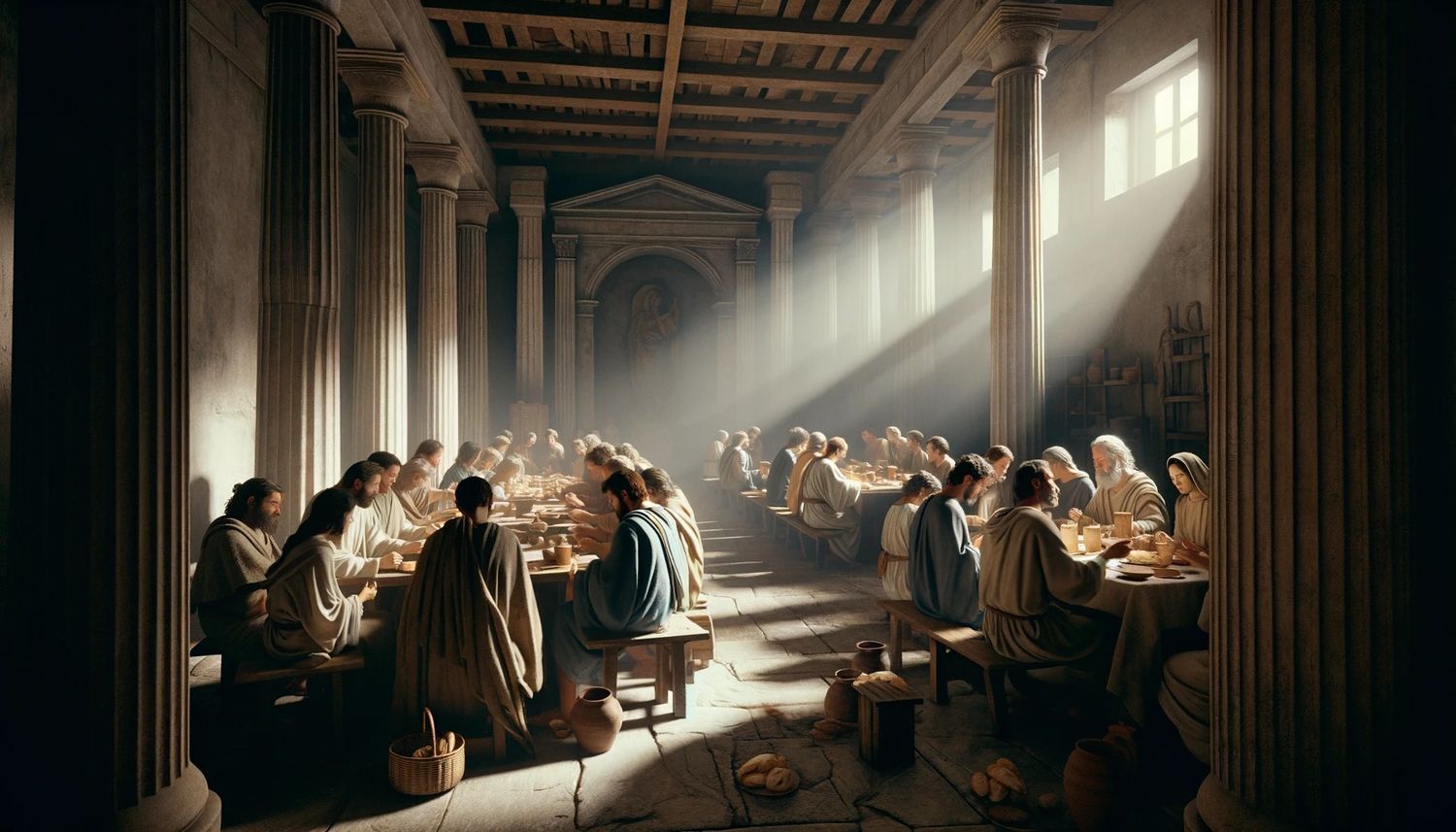Home>Theology and Spirituality>How Did The Concordat Resolve The Crisis Over Catholicism In France


Theology and Spirituality
How Did The Concordat Resolve The Crisis Over Catholicism In France
Published: February 17, 2024
Ericka Andersen, an editor at Christian.net, expertly merges digital strategy with content creation, focusing on faith and societal issues. Her communication skills enhance the platform's engaging narratives, fostering meaningful dialogue on belief's impact on society.
Learn how the Concordat resolved the Catholicism crisis in France and its impact on theology and spirituality. Explore the historical significance and implications.
(Many of the links in this article redirect to a specific reviewed product. Your purchase of these products through affiliate links helps to generate commission for Christian.net, at no extra cost. Learn more)
Table of Contents
Introduction
The crisis over Catholicism in France during the late 18th and early 19th centuries was a tumultuous period marked by political upheaval and religious discord. This era was characterized by the French Revolution, which sought to challenge the authority of the Catholic Church and establish a new order based on revolutionary principles. The revolutionaries aimed to diminish the influence of the Church and create a secular state, leading to a significant rift between the government and the Catholic clergy.
Amidst this turmoil, the Concordat of 1801 emerged as a pivotal agreement that sought to address the contentious relationship between the French government and the Catholic Church. This landmark concordat, negotiated between Napoleon Bonaparte and Pope Pius VII, aimed to reconcile the religious divisions and establish a new framework for the practice of Catholicism in France.
The Concordat of 1801 holds immense historical significance as it not only resolved the immediate crisis over Catholicism but also laid the foundation for a new era of church-state relations in France. By delving into the background of the crisis, the intricacies of the Concordat, and its far-reaching impact, we can gain a deeper understanding of this transformative period in French history. This article will explore the historical context, key provisions, and lasting implications of the Concordat, shedding light on its role in shaping the religious and political landscape of France.
Read more: How Does Catholicism Teach In France
Background of the Crisis over Catholicism in France
The crisis over Catholicism in France was deeply rooted in the historical and social fabric of the country. Prior to the French Revolution, the Catholic Church held immense power and influence, both spiritually and politically. The clergy enjoyed significant privileges and land ownership, often exempt from taxation, which fueled resentment among the populace. The Church's close ties with the monarchy and its role in upholding the ancien régime further exacerbated tensions as the revolutionary fervor gained momentum.
The Enlightenment, with its emphasis on reason, individual rights, and secular governance, also posed a direct challenge to the traditional authority of the Church. Philosophers and intellectuals critiqued the Church's dogma, its alliance with the monarchy, and its control over education and public discourse. This intellectual movement sowed the seeds of skepticism and dissent, laying the groundwork for a reevaluation of the Church's role in French society.
The outbreak of the French Revolution in 1789 marked a turning point in the relationship between the state and the Catholic Church. The revolutionaries sought to dismantle the old order and establish a new social and political framework based on the principles of liberty, equality, and fraternity. As part of this radical transformation, the National Assembly passed laws that curtailed the power of the Church, including the confiscation of church lands, the abolition of monastic orders, and the subordination of the clergy to the state.
The Civil Constitution of the Clergy, enacted in 1790, further exacerbated the crisis by asserting state control over the church, requiring the clergy to take an oath of loyalty to the revolutionary government. This move deeply divided the Catholic community, leading to a schism between those who supported the revolutionary reforms and those who remained loyal to the papacy. The rift between the "constitutional clergy" and the "refractory clergy" intensified the turmoil, creating a fractured religious landscape in France.
Amidst these tumultuous developments, the crisis over Catholicism in France reached a boiling point, setting the stage for the eventual negotiation of the Concordat of 1801. The deep-seated tensions, ideological clashes, and power struggles that characterized this period laid the groundwork for a transformative agreement that would reshape the relationship between the French state and the Catholic Church.
The Concordat of 1801
The Concordat of 1801, also known as the Concordat of Fontainebleau, stands as a landmark agreement that reshaped the religious landscape of post-revolutionary France. Negotiated between Napoleon Bonaparte, then First Consul of France, and Pope Pius VII, the concordat aimed to reconcile the fractured relationship between the French government and the Catholic Church. Signed on July 15, 1801, the Concordat of 1801 marked a significant departure from the revolutionary policies that sought to diminish the influence of the Church, signaling a new era of church-state relations.
This historic agreement comprised a series of articles that delineated the rights and privileges of the Catholic Church in France, effectively redefining its position within the secular state. The Concordat recognized Catholicism as the religion of the majority of the French population, acknowledging its significance while also affirming religious freedom for individuals. It sought to strike a delicate balance between state authority and ecclesiastical autonomy, aiming to restore stability and unity in a country deeply divided by religious and political upheaval.
The negotiation of the Concordat of 1801 was a complex diplomatic endeavor, with both Napoleon and Pope Pius VII seeking to safeguard their respective interests. For Napoleon, the concordat represented an opportunity to consolidate his power and gain the support of the Catholic Church, which held sway over a significant portion of the French populace. By securing an agreement with the papacy, Napoleon aimed to foster domestic tranquility and bolster his legitimacy as the leader of post-revolutionary France.
From the perspective of Pope Pius VII, the Concordat of 1801 presented a chance to reestablish the authority of the Church in France and ensure the protection of religious institutions and clergy. The negotiations involved intricate discussions on matters such as the appointment of bishops, the status of church lands, and the relationship between the papacy and the French government. The resulting concordat sought to address these contentious issues, outlining a framework for the governance of the Catholic Church within the confines of the French state.
The Concordat of 1801 ushered in a new chapter in French history, signaling a departure from the revolutionary policies that had sought to marginalize the Church. Its provisions delineated the organizational structure of the Church, established the process for the nomination and consecration of bishops, and addressed the status of church properties. Additionally, it recognized the religious rights of Catholics while affirming the principle of religious tolerance for non-Catholic denominations.
This pivotal agreement not only resolved the immediate crisis over Catholicism but also set the stage for a redefined relationship between the state and the Church. The Concordat of 1801 represented a strategic compromise that sought to reconcile the competing interests of the French government and the Catholic Church, laying the groundwork for a new era of religious coexistence and state-church collaboration. Its enduring impact reverberated throughout French society, shaping the religious, political, and cultural dynamics of the post-revolutionary era.
Key Provisions of the Concordat
The Concordat of 1801 encompassed several key provisions that redefined the relationship between the French state and the Catholic Church, shaping the religious landscape of post-revolutionary France. These provisions, negotiated between Napoleon Bonaparte and Pope Pius VII, sought to address the contentious issues that had fueled the crisis over Catholicism, laying the groundwork for a new era of church-state relations. The following key provisions encapsulate the transformative impact of the Concordat:
-
Recognition of Catholicism: The Concordat affirmed Catholicism as the religion of the majority of the French population, acknowledging its significance within the societal fabric. This recognition underscored the enduring influence of Catholicism in France while signaling a departure from the revolutionary policies that had sought to diminish the role of the Church.
-
Appointment of Bishops: The concordat delineated a new process for the appointment and consecration of bishops, aiming to strike a balance between state authority and ecclesiastical autonomy. This provision sought to establish a framework for the governance of the Church, addressing the contentious issue of episcopal appointments that had been a source of discord during the revolutionary period.
-
Status of Church Lands: The Concordat addressed the status of church properties that had been subject to confiscation and reorganization during the revolution. It sought to restore a degree of stability by delineating the rights and privileges pertaining to church lands, thereby safeguarding the material interests of the Church within the evolving socio-political landscape.
-
Religious Tolerance: While affirming the preeminence of Catholicism, the Concordat also recognized the principle of religious tolerance for non-Catholic denominations. This provision reflected a nuanced approach to religious diversity, acknowledging the rights of individuals to practice their faith while upholding the primacy of Catholicism within the state framework.
-
Reconciliation with the Papacy: The Concordat represented a significant step towards reconciliation with the papacy, signaling a thaw in the strained relations between the French government and the Catholic Church. By negotiating this agreement, both Napoleon and Pope Pius VII sought to mend the rift that had emerged during the revolutionary upheaval, laying the groundwork for a renewed partnership between the secular and ecclesiastical authorities.
These key provisions of the Concordat of 1801 encapsulate the multifaceted nature of the agreement, addressing the intricate challenges that had defined the crisis over Catholicism in France. By navigating the complexities of religious governance, episcopal authority, and the status of church properties, the Concordat sought to establish a new equilibrium that would shape the religious and political dynamics of post-revolutionary France.
Impact of the Concordat on the Crisis
The Concordat of 1801 exerted a profound and multifaceted impact on the crisis over Catholicism in France, reshaping the religious, political, and social dynamics of the post-revolutionary era. This transformative agreement, negotiated between Napoleon Bonaparte and Pope Pius VII, played a pivotal role in resolving the deep-seated tensions that had characterized the relationship between the French government and the Catholic Church. Its impact reverberated across multiple dimensions, leaving an indelible imprint on the crisis and its resolution.
Reconciliation and Stability
The Concordat of 1801 facilitated a crucial reconciliation between the secular and ecclesiastical authorities, marking a significant departure from the acrimony and discord that had defined the revolutionary period. By negotiating this agreement, both Napoleon and Pope Pius VII sought to mend the rift that had emerged during the upheaval, laying the groundwork for a renewed partnership. This reconciliation fostered a sense of stability and unity, mitigating the deep divisions that had plagued French society and paving the way for a more harmonious coexistence between the state and the Church.
Restored Religious Institutions
The Concordat sought to restore the authority and integrity of religious institutions that had been profoundly disrupted during the revolutionary tumult. By delineating the rights and privileges of the Catholic Church, addressing the status of church lands, and establishing a framework for the appointment of bishops, the agreement aimed to safeguard the material and organizational interests of the Church. This restoration of religious institutions contributed to a sense of continuity and tradition, assuaging the anxieties of the clergy and the faithful while reinforcing the enduring role of Catholicism in French society.
Redefined Church-State Relations
The Concordat of 1801 redefined the relationship between the French state and the Catholic Church, establishing a new equilibrium that sought to balance state authority with ecclesiastical autonomy. This redefined dynamic set the stage for a collaborative partnership, wherein the Church retained its spiritual authority while acknowledging the primacy of the state in secular matters. The concordat delineated a framework for religious governance that sought to harmonize the competing interests of the secular and ecclesiastical authorities, laying the groundwork for a more cohesive and cooperative relationship.
Enduring Legacy
The impact of the Concordat extended far beyond the immediate resolution of the crisis, shaping the religious and political landscape of post-revolutionary France for years to come. Its enduring legacy reverberated through the 19th century and beyond, influencing the evolution of church-state relations and the practice of Catholicism in France. The concordat's impact on the crisis transcended its immediate context, leaving an indelible imprint on the historical trajectory of French society and its religious institutions.
The Concordat of 1801 stands as a testament to the transformative power of diplomatic negotiation and strategic compromise, offering a nuanced resolution to a crisis that had threatened to unravel the fabric of French society. Its impact on the crisis over Catholicism underscores the pivotal role of this landmark agreement in shaping the contours of religious governance and state-church relations in post-revolutionary France.
Conclusion
In conclusion, the crisis over Catholicism in France during the late 18th and early 19th centuries was a tumultuous period marked by profound societal and political upheaval. The Concordat of 1801, negotiated between Napoleon Bonaparte and Pope Pius VII, stands as a pivotal milestone in the resolution of this crisis. By addressing the contentious relationship between the French government and the Catholic Church, the concordat ushered in a new era of religious coexistence and state-church collaboration.
The background of the crisis, rooted in the historical tensions between the Church and the revolutionary forces, set the stage for the transformative impact of the Concordat. The concordat's key provisions, including the recognition of Catholicism, the appointment of bishops, the status of church lands, and the principle of religious tolerance, redefined the relationship between the state and the Church, restoring stability and unity in a country deeply divided by religious and political turmoil.
The Concordat of 1801 exerted a profound impact on the crisis, fostering reconciliation and stability, restoring religious institutions, and redefining church-state relations. Its enduring legacy reverberated through the 19th century and beyond, shaping the religious and political landscape of post-revolutionary France. This landmark agreement stands as a testament to the transformative power of diplomatic negotiation and strategic compromise, offering a nuanced resolution to a crisis that had threatened to unravel the fabric of French society.
The Concordat of 1801 holds immense historical significance, not only for its immediate impact on the crisis over Catholicism but also for its enduring influence on the evolution of church-state relations in France. By navigating the complexities of religious governance and state authority, the concordat laid the groundwork for a new equilibrium that would shape the religious and political dynamics of post-revolutionary France. Its role in reconciling the competing interests of the French government and the Catholic Church underscores its pivotal contribution to the resolution of the crisis and its lasting impact on the historical trajectory of French society.
In essence, the Concordat of 1801 stands as a testament to the transformative power of diplomacy and compromise, offering a nuanced resolution to a crisis that had threatened to unravel the fabric of French society. Its impact on the crisis over Catholicism underscores the pivotal role of this landmark agreement in shaping the contours of religious governance and state-church relations in post-revolutionary France.













